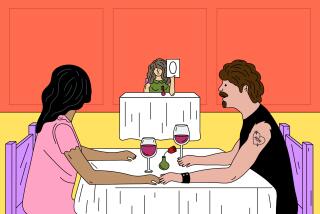When a New Romance Breaks Up the Old Gang
- Share via
When a single person becomes involved in a romantic relationship, will it inevitably interfere with his friendships?
Our traditional notion of romantic love requires the lovers to gladly surrender their individual hobbies and friends to enter a world that revolves around the two of them. But real life is often very different from the cliched ideas we grew up with.
What happens to friendships after romance? Two readers wrote to ask that question.
Nan, 29, a office manager from Charlotte, N.C., writes: “I have several close single friends. I often would have dinner with one or more of them, or we’d go to a movie or to someplace where we could meet men. Then I started going out with Peter about five months ago and now we practically live together.
“I have less time for my friends and some of them are angry. One said, ‘A man enters your life and you forget I exist.’ It’s not entirely true because I spend some time with my friends either with Peter or by myself, but I do see them less often than I used to.
“I feel terribly guilty about it, first because I think it’s wrong to neglect friends and, second, because I am a feminist and remember the rhetoric about not breaking plans with female friends just because a man asks for a date. But I cannot deny what I feel. Most nights, particularly on weekends, I’d rather watch TV or see a movie with Peter than go out with my friends. Is that terrible?”
No, Nan, it isn’t terrible. Enjoying the company of your romantic partner is natural. One of the hallmarks of romantic love is the wish to be with and do things with the loved person.
On the other hand, it is unhealthy to drop your friends so that your life can revolve around one person. That can be a narrowing, risky situation. But even though you realize the importance of maintaining your friendships, your relationship with Peter is going to have an impact on them. The nature of that impact will depend on all the people involved.
You are responsible for including your friends in your life. Make time to call them and do things with them so that they feel reassured that they are still an important part of your life.
Peter can help by not demanding all your time, and by understanding the significance of your friendships. He should also be willing to include your friends in some of things the two of you do together.
Your friends must recognize that your relationships with them cannot proceed exactly as it did before you met Peter. They must also realize that you will not have as much time to spend with them.
As Nan’s letter suggests, a woman’s guilt in relation to her female friends is sometimes increased by feelings that she is betraying a sense of “sisterhood.” (And sometimes her friends will try to make her feel she is breaking female ranks while their underlying motives may be their own loneliness or envy.) Men also experience guilt and discomfort when a romantic involvement changes their availability to their friends. Some guys’ friends make them feel that they are betraying “brotherhood.”
A letter from Alex, 26, a sound engineer, reads: “My friends are always asking me to party with them, but since I’ve met Jenny I’d rather be with her. They think Jenny leads me around and keeps me from being with them. That’s not true. She’s cool about my being with the guys. But I don’t like their being angry at me.”
It takes work to make time for your romantic partner and maintain your friendships. But if the fear of your friends’ disapproval is so great that it interferes with the romance, something deeper may be going on. You may have feelings that go back a long way--perhaps learned during childhood--that it is wrong or dangerous for you to be happy when someone else is not. And that may now make you uncomfortable about spending time with your girlfriend or boyfriend when a friend is without a partner.
It would be just as self-defeating to let fear of your friends’ disapproval interfere with a romantic relationship as it would be to become so addicted to your partner that you ignore your friendships.


